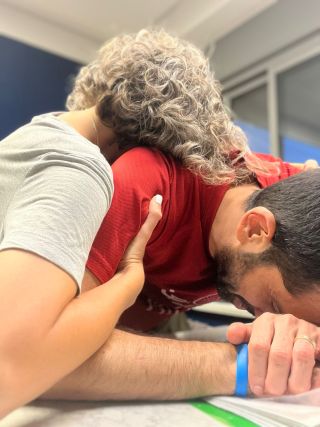Relationships
All Is Fair in Love and War?
An Israeli couples therapist reflects on marriage in wartime.
Posted October 29, 2023 Reviewed by Hara Estroff Marano
Key points
- Wartime sends partners into survival mode, which is the opposite of being relational.
- Yet our greatest resource in times of crisis is our relationship.
- Disasters force us to renegotiate our relationship and find new ways of being together.
- Sofa time, movement, and other techinques help partners lean on each other and thrive.

Co-authored by Galit Romanelli, M.A.
I’ve lived in Israel most of my life. I’ve endured terrorist attacks, military operations, buses blowing up in my city, and much more.
But nothing is like what I’m experiencing now.
As we slowly started hearing the news of the horrible massacre on 10/7, I realized my country will never be the same.
I won’t be the same.
And my marriage will never be the same.
“An abnormal reaction to an abnormal situation is normal behavior.” Viktor Frankl
These past two weeks, my wife, Galit, and I have gone through every possible emotion and state of being: from dissociation, anger, sadness, arguing over food, yelling at the kids, crying in each other's arms, hugging the kids in the bomb shelter, listening to music, and even trying to make love.
After three days of total shock and dissociation, I realized that I was deep in survival mode: stonewalling Galit and withdrawing inward. My body began to stiffen, while I couldn't watch any more news. I was pushing Galit away and dissociating emotionally. When we’re in survival mode, all our resources are focused on our safety, fewer on being vulnerable with our partner.
Yet our relationship is a crucial resource for our personal (and societal) health and resilience. We realized that we need to go against our natural tendency to retreat inward and reach out toward each other in order to live. Since this war will change our marriage forever, we had to lean in and rediscover it.
For the past two weeks, we opened a relationship war room, where we teach couples emergency relationship tools that will help them stay connected and vulnerable during these trying times.
Rules of Engagement
Violence, crisis, and trauma have touched many of us to some degree or another. Below, we’ve listed our top relational hacks to help you and your relationships move forward, so as not to only survive but thrive.
Move. Emotion = Energy in Motion. Moving helps your emotions flow through you and not get stuck. Try taking a walk, dance in the living room, or even just shake your body.
Express Your Feelings. In extreme situations, you’ll experience every feeling from elation to deep despair. All those feelings are important and necessary. But if you want to stay somewhat regulated, you must name it to tame it. Verbalizing your feelings helps validate them and render them subject to control. Crying is a healthy release of emotion, so feel free to cry next to your partner and children.
Lean on Your Thirds. During challenging times, your partner will also be flooded and may not be able to be present for you. We’ve found that leaning on a third party (friend, family member, therapist) is crucial for us to maintain our marriage. Our partner can’t possibly answer all our needs. After we emotionally release on the third, we feel better, and therefore it will be easier for us to be there for our partner.
Look with Kind Eyes. During war, both partners are edgy and tense. Therefore they eventually will be short, aggressive, jabby, sarcastic, or just plain mean to each other. I consider that part of what David Schnarch calls normal marital sadism. Therefore, instead of regularly taking offense, take a breath and cut them some slack. Compassion and forgiveness will go a long way during these times.
Touch. Touch is a powerful means to connect and regulate our nervous system, but in times of trauma or crisis some people may not want to be touched at all. The best way to know is to simply ask, “Do you need a hug?" "Do you want some space?” and do exactly what they answer. Keep asking because the answer may change daily.
Support, Don’t Rescue. It’s hard to see our partner suffer. It’s important to recognize and avoid getting sucked into the martyr role of attempting to meet all your partner's needs. This leads to a problematic victim triangle dynamic. Instead, try to be a supporter, stating: “I’m here. How can I help?” Being a differentiated supporter allows your partner to remain the expert to themselves and strengthens their sense of agency.
Establish Firm Boundaries. When you say no to your partner, you’re saying yes to yourself. If your partner’s request does not work for you, then protect your boundaries. Boundaries are the distance that allows you to love yourself and your partner. If we won’t protect ourselves, we’ll burn out—and resent will seep in.
Take Sofa Time. What is not verbalized will be acted out (negatively). Try to make a daily routine in which one of you lies on the sofa and the other sits beside as a listener. The partner lying down shares all their feelings, fears, thoughts, dreams, hopes, and more. The listener is there just to be a curious, loving witness. After five minutes switch roles.
Curate Your Feed. Make sure your content intake gives you strength, hope, and vitality. Turn off social media and the news at night. You are the curator of your space and environment, including your digital space as well. Limit screen time and replace that time with some face-to-face time with your partner, .
Find Purpose. At times of crisis, helping others gives you meaning and creates community. It can be as small as carrying someone’s groceries or donating clothes. By giving to others you're gaining not only a sense of agency but also of hope and connection - which will help you survive these hard times.
Today I am voluntarily going back to the army as a mental health officer to help prevent PTSD in soldiers. As I embark to the front lines, I pray that couples will be able to hold on to each other in order to build a peaceful future.
Galit Romanelli, M.A., is a certified personal coach and co-director of The Potential State, helping couples remarry each other.
References
Brackett, M. (2019). Permission to Feel: Unlocking the power of emotions to help our kids, ourselves, and our society thrive. Celadon Books.
Schnarsh, D. (1997). Passionate marriage: Keeping love and intimacy alive in committed relationship. New York, NY: Owl books.




